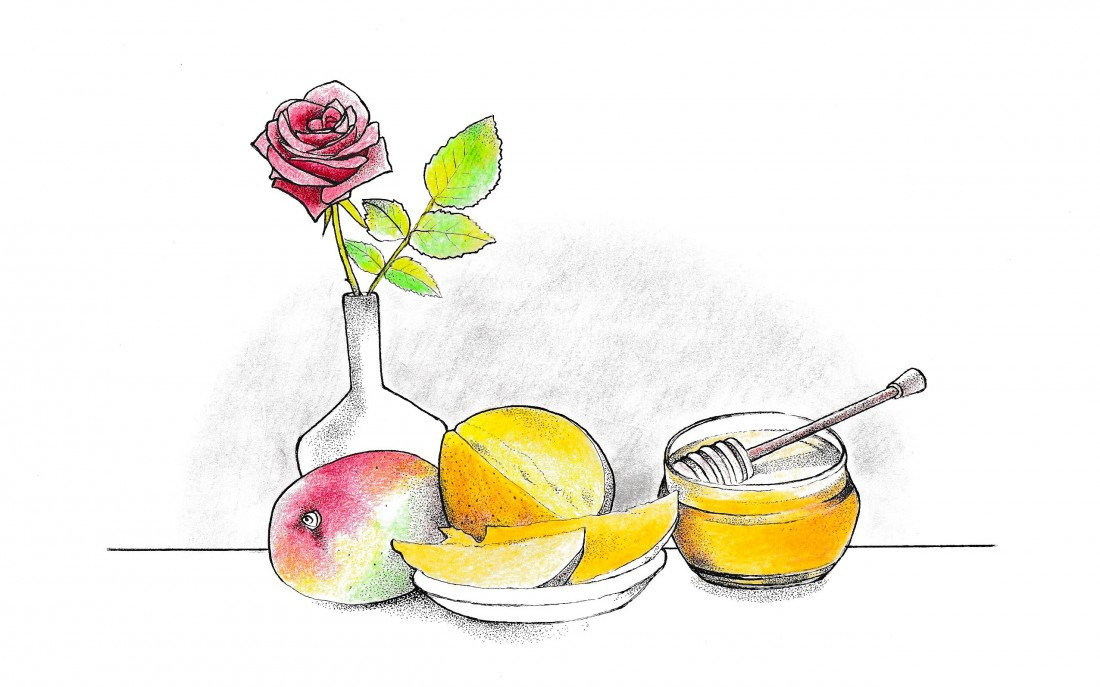Feeding diaspora
My love is honey
I immediately swoon at the love, lineage, healing and pleasure that undertones writing and art by People of Colour involving food. Food and love are both so potent. They are embodied experiences marked by longing, sustenance, nourishment, orientation and legacy.
Writers and Artists of Colour creating work about romantic love and food inherently express a diasporic autobiographical subjectivity. Diasporic romanticism, love, race, place and intergenerational inheritance become enmeshed.
When I was introduced to the band Alsarah and the Nubatones, I immediately fell in love. Sung in Arabic, the first track I heard – “Habibi Taal” – had a powerful and transcendent spirit to it, that I only understood later after looking up the translation:
“my love is like mangos and apples, / my love is honey, all else are bland / my love is honey, all else are bland / I would migrate just to be with you / oh my love.”
The words oozed off my phone screen as I revelled in the food metaphors of love: wet, ripe, beautiful, sweet, sticky, creamy, abundant, invigorating, revitalizing.
Led by Sudanese-born, Yemen-raised and American-based Alsarah, the willingness to migrate for love expressed in the lyrics demonstrates the boldness of pursuing the finest flavours and textures of life and settling for no less. It signals a diasporic inclination to continue moving despite experiences of forced displacement.
In addition to comparing food to love, poets also compare food to their lovers’ bodies. Toronto/Oakland-based Leah Lakshmi Piepzna-Samarasinha of Burgher/Tamil Sri Lankan and Irish/Roma ascent frequently does this, weaving narratives of trauma, migration, community, love, sex, disability, friendship, food and queerness at once.
In her book Love Cake, Piepzna-Samarasinha writes, “as you flip me on the bed / as I hiss lick right there / as your chai belly platano thighs / perfect hands meet mine / make miracle home on this bed.”
Through writing, the entanglements of food, cultural identity, home and romance are made evident. Embodying food metaphors or food stories with desire sparks visions of utopia. Sex is love-making is home-making. The body is a site of various kinds of intimacy. It is the material location of connection, longing, fulfillment, nourishment, healing and pleasure.
In her book Pressure Cooker Love Bomb, Winnipeg/Calgary-based South Asian poet Sharanpal Ruprai writes:
“side of your neck, i lick, / suck on your earlobe / you are sweet like jalebi / you smell of the candy aisle / sticky on my lips a lick up and in around / i suck sweet out you will be my first lover / you will linger take me into your mouth // i tell you that i want to grow old / with you when i’m old i’ll garden / in overalls and rainbow rain boots / no bra no underwear / every evening we will have jalebis / in hot milk”
The physical, sexual and political orientations of queer People of Colour in love articulated by Ruprai and Piepzna-Samarasinha demonstrate that place-making is an erotic project. Comforts of home and belonging are manifested through intimacies that honour and share cultural inheritance such as food.
Self-described as “poems masquerading as recipes, poems masquerading as survival guides, poems simmered in love,” Ruprai’s writing contends with other aspects of cultural inheritance too, like heteronormative scripts placed on Sikh girls: “hating aunties never / had a chance to be loved / they followed racism rules, / cooking rules, body hair removal rules, / religious rules, a pressure cooker / life of auntyji is not yours.”
With the common experiences of exile and displacement marked by multiple oppressions of queerness, transness, racialization, war, conflict, colonization and white supremacy, queer and trans People of Colour are both challenged and satiated by defying authority, binaries and borders.
Art and writing heals and builds liberated, authentic worlds by honouring deviancy, centring pleasure and queering place, labour and love. I live at the intersection of food and romance, driven by a hunger for something sweet, something both familiar and surprising – a consumption both grounding and transcendent.
Christina Hajjar is a first-generation Lebanese-Canadian pisces dyke ghanouj with a splash of tender-loving rose water and a spritz of existential lemon, served on ice, baby. Catch her art, writing and organizing at christinahajjar.com or @garbagebagprincess.
Published in Volume 74, Number 24 of The Uniter (April 2, 2020)








